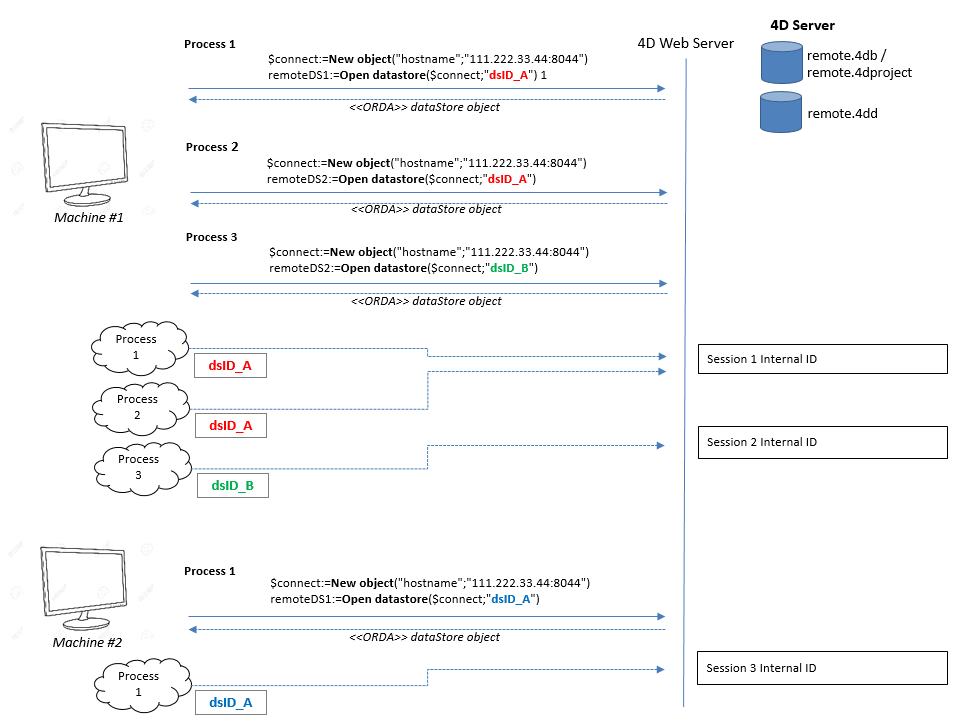Datastores remotos
Um datastore remoto é uma referência, em uma aplicação 4D local (4D ou 4D Server), a um datastore armazenado em outra aplicação 4D.
O aplicativo 4D local se conecta ao datastore remoto e faz referência a ele por meio de uma chamada ao comando Open datastore.
Na máquina remota, 4D abre uma sessão para lidar com solicitações da aplicação que chamam Open datastore. As solicitações usam internamente a API REST, o que significa que elas podem exigir licenças disponíveis.
Usando sessões web
Quando você trabalha com um datastore remoto referenciado por meio de chamadas para o comando Open datastore, a conexão com os processos solicitantes é tratada por meio de web sessions na máquina remota.
The web session created on the remote datastore is identified using a internal session ID which is associated to the localID on the 4D application side. Essa sessão gerencia automaticamente o acesso a dados, seleções de entidades ou entidades.
El localID es local a la máquina que se conecta al datastore remoto, lo que significa:
- Si otros procesos de la misma aplicación necesitan acceder al mismo datastore remoto, pueden utilizar el mismo
localIDy, de este modo, compartir la misma sesión. - Si otro proceso de la misma aplicación abre el mismo datastore remoto pero con otro
localID, creará una nueva sesión en el datastore remoto. - Si otra máquina se conecta al mismo datastore remoto con el mismo
localID, creará otra sesión con otra cookie.
Estes princípios são ilustrados nos gráficos seguintes:

Visionamento de sessões
Os processos que gerenciam sessões para acesso ao armazenamento de dados são mostrados na janela de administração do 4D Server:
- nombre: "REST Handler: <process name>"
- type: type Worker Server HTTP
- sesión: el nombre de la sesión es el nombre de usuario que se pasa al comando
Open datastore.
No exemplo a seguir, dois processos estão sendo executados na mesma sessão:

Fechamento das sessões
Conforme descrito no tempo de vida da sessão, uma sessão web é fechada automaticamente por 4D quando não há atividade durante seu período limite. El tiempo de espera por defecto es de 60 mn, pero este valor puede modificarse utilizando el parámetro connectionInfo del comando Open datastore.
Se uma solicitação for enviada ao repositório de dados remoto depois que a sessão tiver sido fechada, ela será recriada automaticamente, se possível (licença disponível, servidor não parado...). However, keep in mind that the context of the session regarding locks and transactions is lost (see below).
Bloqueio e transacções
Os recursos do ORDA relacionados ao bloqueio de entidades e à transação são gerenciados no nível do processo em repositórios de dados remotos, assim como no modo cliente/servidor do ORDA:
- Si un proceso bloquea una entidad de un datastores remoto, la entidad se bloquea para todos los otros procesos, incluso cuando estos procesos comparten la misma sesión (ver Bloqueo de entidades). Se várias entidades que apontam para um mesmo registro tiverem sido bloqueadas em um processo, todas elas deverão ser desbloqueadas no processo para remover o bloqueio. Se um bloqueio tiver sido colocado em uma entidade, o bloqueio será removido quando não houver mais referência a essa entidade na memória.
- Las transacciones pueden iniciarse, validarse o cancelarse por separado en cada almacén de datos remoto mediante las funciones
dataStore.startTransaction(),dataStore.cancelTransaction()ydataStore.validateTransaction(). Não têm impacto noutros datastores. - Classic 4D language commands (
START TRANSACTION,VALIDATE TRANSACTION,CANCEL TRANSACTION) only apply to the main datastore (returned byds). Se uma entidade de um datastore remoto é segurada por uma transação em um processo, outros processos não podem atualizá-lo, mesmo que esses processos compartilhem a mesma sessão. - Os bloqueios nas entidades são removidos e as transações são anuladas:
- quando o processo é eliminado.
- quando a sessão é encerrada no servidor
- quando a sessão é encerrada na janela de administração do servidor.